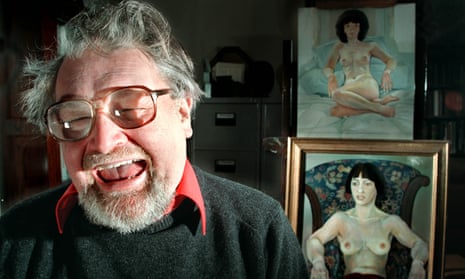When I read Lanark, it felt as if it was my discovery. Obviously it was not: Alasdair Gray’s novel had been in the world for 23 years by then. (It arrived, like me, in 1981.) But Lanark is so entirely surprising that any first encounter with it is an encounter with the new. It is the kind of book that could look like proof of madness if it had never been published, a 600-page epic with elaborate illustrations (by Gray) and idiosyncratic typesetting, interlacing realist sections set in Glasgow with satirical fantasy set in a parallel city called Unthank, written in four books and starting with book three.
I fell in love. It was an unlikely passion. Gray displayed his politics with disarming plainness – he believed in Scottish independence and socialism; I was a milksop unionist and social democrat. Moreover, I was a feminist, and Gray was a sometime pornographer whose female characters barely scrape two dimensions. Lanark is not particularly dirty, but Gray’s superb second novel, 1982, Janine, is unambiguous filth, chronically the compulsive, unruly fantasies of a middle-aged man called Jock. Something Leather is straight-up lechery. But Gray’s writing is not the tyrannical kind that can only be enjoyed if you agree with him. He makes easy company with disagreement.
In Lanark, the eponymous hero becomes a delegate to a council of nations where he is shocked by the cynicism of statecraft. Lanark speaks up floridly for idealism: “We have no nature,” he says. “Our natures are not built instinctively by our bodies, like beehives; they are works of art … It is bad habits, not bad nature, which makes us repeat the dull old shapes of poverty and war.” “Your flood of language is delicious,” says the senior politician he is trying to influence, “and can have no possible effect upon human nature.” This exchange is the essence of Gray’s politics. We could be better, and we will continue to be bad so long as we cannot honestly reckon with our own badness.
It’s this clarity about human (specifically male) failings that makes his writing about sex compelling, rather than repulsive. His sparkling Victorian pastiche Poor Things offers two accounts of the origins of a woman called Bella McCandless. Should we believe Bella’s husband’s sensational telling, in which she is the product of a male scientist’s experiment to produce the perfect child-woman (the brain of an unborn infant implanted in the body of its dead mother)? Or should we believe Bella’s counter-narrative, in which she furiously asserts that she is a real person after all?
Embedded in the fantastical version is a frightening kind of truth about how men see women. The broadly tedious genre of men interrogating masculinity has a long way to go before it catches up with Gray’s sharp eye on power and desire, his keen sense of the taboo on men confessing vulnerability. Perhaps this is why I have pressed Gray’s novels on my friends with such disturbing intensity: here, read this and then you will know how I see the world.
There is an instant understanding between those who love him. We know, for example, how everyone can be sorted into the “softs” and “dragonhides” of Lanark – mirror afflictions of the inhabitants of Unthank, who are either so open they become mulch or so hardened that they burn up in armoured shells. And though Gray’s startling debut threatens to dwarf almost everything, including his own subsequent work, really there is nothing he wrote that isn’t worth reading, right through to the elegiac (but still saucy) Old Men in Love. All of it is there to be discovered.

Comments (…)
Sign in or create your Guardian account to join the discussion